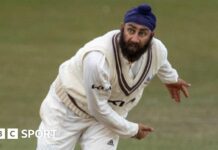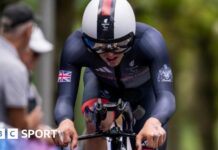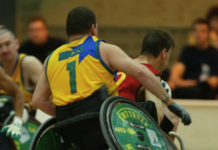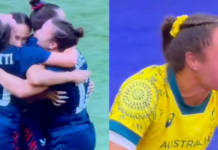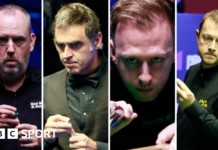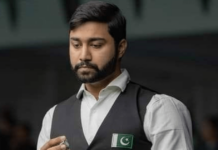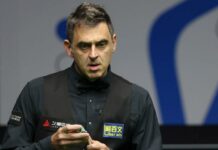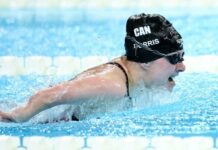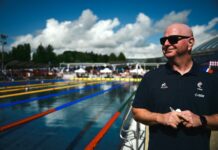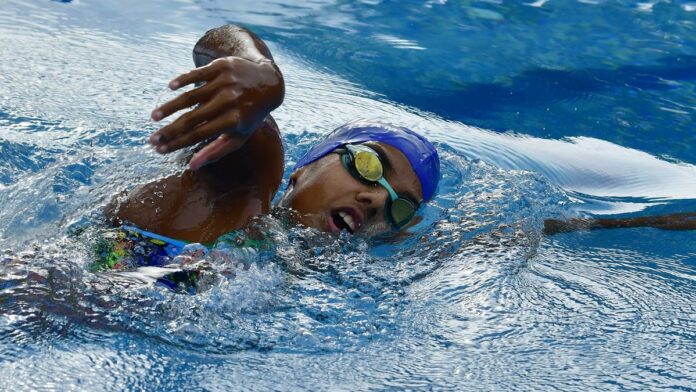2024 PARIS SUMMER OLYMPIC GAMES
Tonight marks the first act that will open the doors to the Paris 2024 Olympic Games. Tomorrow, however, swimmers will need to wake up early to attend the first day of competition at the Defense Arena in Paris.
Among the various high-level athletes we eagerly anticipate seeing in action, the Olympics are also known for providing a stage to swimmers who otherwise might not have this opportunity.
Some of these athletes are members of the Refugee Team, others have unique stories or come from developing countries and have not reached the OQT. All these athletes have been invited by the International Olympic Committee and will compete alongside other swimmers.
Analyzing swimmers in this category, the universality places, we have found seven swimmers who were born after the supersuit era.
They are 14 or 15 years old.
At 14, I was still missing the bus to get home.
BABY SWIMMERS
DHINIDHI DESINGHU – 14 YEARS OLD
BIRTH DATE: May 17, 2010
NATIONALITY: India
EVENTS IN PARIS:
200m Freestyle Women
02:04:24
25/31 entry time
We have already discussed this Indian swimmer, born on May 17, 2010, in the Swimswam Italia’s special journey to the Olympics,
Dhinidhi is the youngest swimmer on this list, just turned 14, and will compete in the 200m free. Despite her young age, she is the athlete on this list who has stood out the most for her results. The time with which she arrives in Paris is also the Indian national record.
The 14-years old started swimming in 2018 to overcome her shyness, and rapidly fell in love with swimming pools.
Desinghu trains at the Dolphin Aquatics academy in Bengaluru, where her Coach BM Madhunkumar immediately saw her potential, and started helping her to reach new limits. One of the most succesful coaches in India, Nihar Ameen, saw her talent and became her new coach. Ameen says that Desinghu is one of the few swimmers in India who swims with the straight arm technique.
At 12 years old the indian swimmer were already competing against women who could have been her mother, at the national Championships. She took part at Doha World Championships held last February 2024.
Desinghu said about Paris Olympics that she is excited to be there at such a young age, and she hopes to meet her idol Katie Ledecky. She even prepared a gift to give her.
Her coach thinks that if she can manage the pressure coming from the media, she will do great things in Paris.
“Once she’ll dive in the water, it’s all about doing what she can do best: swim”
LOIS ELIORA IRISHURA – 14 YEARS OLD
BIRTH DATE: April 15, 2010
NATIONALITY: Burundi
EVENTS IN PARIS:
50m Freestyle Women
29.73
57/79 entry time
MAIA CHOULOUTE – 14 YEARS OLD
BIRTH DATE: November 18, 2009
NATIONALITY: Haiti
EVENTS IN PARIS:
50m Freestyle Women
30.09
59/79 entry time
ANAHIRA MCCUTCHEON – 14 YEARS OLD
BIRTH DATE: October 5, 2009
NATIONALITY: Fiji
EVENTS IN PARIS:
50m Freestyle Women
26.67
35/79 entry time
The Fiji swimmer McCutcheon will be the sole representative of swimming for her nation at Paris 2024. McCutcheon is positioned in the first half of the entry list for the fastest women in the 50m freestyle.
DJENABOU JOLIE BAH – 14 YEARS OLD
BIRTH DATE: October 3, 2009
NATIONALITY: Guinea
EVENTS IN PARIS:
50m Freestyle Women
31.93
67/79 entry time
MAROUANE MAMANE HAMISSOU ABBA – 15 YEARS OLD
BIRTH DATE: January 21, 2009
NATIONALITY: Nigeria
EVENTS IN PARIS:
50m Freestyle Men
32.67
75/75 entry time
TROY NISBETT – 15 YEARS OLD
BIRTH DATE: January 6, 2009
NATIONALITY: St. Kitts and Nevis
EVENTS IN PARIS:
50m Freestyle Men
29.02
70/75 entry time
WHAT UNIVERSALITY PLACES ARE
Universality Places are reserved spots that ensure every nation is represented by at least one swimmer per event. Only countries lacking such spots or with only 1 qualified (or invited) athlete can admit 1 swimmer in this category. Each nation can have a maximum of 2 athletes, 1 male and 1 female.
To be eligible for Universality Places, the swimmer must have participated in the 20th FINA World Championships 2022 in Fukuoka, held in 2023, and/or the 21st FINA World Championships 2024.
THE OLYMPIC SPIRIT
How many times have we heard “The important thing is not to win, but to participate”? Too many, I imagine. This quote is not always true. I challenge you to say it in front of an Olympic champion.
Yet, when it comes to the Olympics, this sentence takes on a different meaning. Sure, the goal of sports is always to do one’s best to overcome every limit, but when it comes to the Olympics, just managing to qualify represents the greatest success of many athletes’ careers.
The difference between the Olympic Games and any World or European Championships lies in its philosophy. On one hand, the Olympics are the most important stage an athlete could dream of to showcase their sporting talent; on the other, they offer a unique scenario in terms of diversity and equality.
Firstly, during the Olympic Games, we have the chance to witness all imaginable sports, all taking place in the same city. The fact that all the world’s best athletes are in the same place with a common goal is something unique and incredible. A whole country stops for over a month just to admire them.
But the most unique and fascinating aspect of the Games is that everyone must be able to participate. All nations must have their own representation, and that is why tonight we will see 206 delegations parading along the Seine.
Where a country cannot reach due to lack of resources and support, the Olympics (attempt to) come to the rescue. Where inequality in terms of wealth and access to sports facilities prevails, the Olympics try to represent that bridge connecting even those struggling countries, where having a pool to train in is not taken for granted.
For a few days, sports unite 206 different countries, rivals, but united toward a single goal: reaching the Olympus.
This is why I am amazed by a 14-year-old swimmer from Burundi who can swim 50 meters freestyle in under 30 seconds. And not just because I have managed to do it only once, by accident, but because I can imagine what this 29.73, or that 32.67 from the Nigerian swimmer, could become if they were trained in more developed and suitable environments for a young athlete.
In this way, we move closer to reducing the existing differences and making the playing field for all countries almost the same, so that one of the fundamental rules of Olympism is respected:
“The Olympic Games are for the world and all nations must be admitted to them”
– Pierre de Coubertin
Source link : https://swimswam.com/who-are-the-youngest-swimmers-we-will-see-at-paris-2024-olympics/
Author :
Publish date : 2024-07-26 17:22:34
Copyright for syndicated content belongs to the linked Source.








